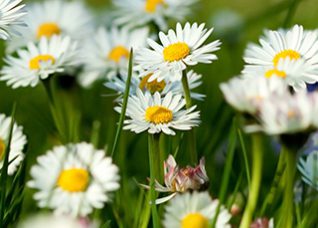
MinerAlert

MinerAlert
Matricaria recutita, Chamaemelum nobile
Manzanilla, Camomila

The flower heads.
Both species of Chamomile (Roman or perennial and German or annual) are usually employed as tea and have similar therapeutic applications, although their chemical components are not entirely the same. Chamomile extracts, capsules and tinctures are also available. Chamomile preparations are also used externally as poultices and eye drops
The two species of Chamomile have been used for a variety of ailments including: colic (especially in children), bloat, mild upper respiratory infections, premenstrual pain, anxiety and insomnia. Chamomile tea is also used to promote labor. Externally, Chamomile is used to treat sore and chapped nipples in nursing mothers, as well as minor skin infections and abrasions. Eye drops made from these herbs are also used for tired eyes and mild ocular infections.
Safety/Precautions:
Before you decide to take any medicinal herb or herbal supplement, be sure to consult with your health care professional first. Avoid self-diagnosis and self-medication: Always be on the safe side!